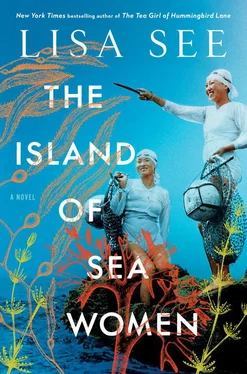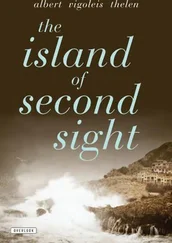But of course she did, because I would have noticed if anything was missing.
“I was showing you respect,” she insisted.
This I had to believe.
“The sooner this is behind us, the better,” I said. “I’ll take you.”
Joon-lee rewarded me with her father’s smile.
But I was still hurt. These past few years, I’d been obliged to accept orders from the man from the Village Fishery Association, but my consolation had come from knowing I was giving my daughter the best education possible. She was smart and ambitious. She knew things I would never know. But now I saw other realities: You can do everything for a child. You can encourage her to read and do her math homework. You can forbid her to ride a bike, giggle too much, or see a boy. I’d just asked her to promise she wouldn’t see Yo-chan or Mi-ja again. She’d done so grudgingly. Sometimes everything you do is as pointless and as ineffective as shouting into the wind.
A Guest for One Hundred Years
1972–1975
“Sit. Sit,” I said in heavily accented English to the American soldiers. I squatted on my haunches, surrounded by plastic tubs filled with abalone, sea cucumber, sea squirt, and sea urchin. I also had a basket stuffed with paper plates, plastic spoons, and napkins. These servicemen on leave from battles in Vietnam looked young to me, but some of them had a haunted look I easily recognized. Or they were drunk. Or using drugs.
“What are you selling today, Granny?” a local boy the servicemen had hired asked.
“Here’s sea squirt—the ginseng of the sea. It will help these men below the belt.”
The boy translated this. A couple of the soldiers laughed. One turned bright red. Two others pretended to gag. Young men. Even when they’re embarrassed they try to outdo each other. I could profit from that. I reached into a tub and pulled out a sea squirt.
“See how it looks like a rock,” I said, with the local boy quietly repeating my words in English. “Look more closely. It’s covered in sea moss. Does it look familiar yet?” My knife slit open the underside and spread the creature apart. “What does this look like now? A woman’s privates! That’s right!” I switched to English. “Eat.”
The soldier who’d blushed earlier now turned crimson, but he ate it. His companions slapped him on the back and shouted I-don’t-know-what. I poured homemade rice wine into abalone shells. The soldiers held the shells to their lips and swilled down the white liquid. I next sliced abalone, which they dipped into chili sauce. When they were done, I pointed to an octopus, still alive, and curled at the bottom of one of my tubs. I grinned, poured more rice wine into their shells, and encouraged them to drink. I watched as they egged each other on. Finally, the boy they’d hired said, “They’ll try it.”
Soon sliced suckers writhed and twitched on a plate. “Be careful,” I warned in English. Then I switched to my native tongue. “The squirming bits are still alive. Those suction cups can grab your throat. You’ve had a lot to drink. I don’t want you to choke and die.”
Hoots of daring. More rice wine. And soon the pieces of octopus were gone. These men were so different from the ones I’d met during my itinerant work. I remembered that time the chef climbed down the rope ladder to our boat and refused anything and everything except what was most recognizable to him: fish.
The tallest of the soldiers pulled out a stack of postcards. He showed them to his friends, who nodded appreciatively. Then he held one out to me, pointed, and spouted a string of English words.
“Tell us, Granny,” the Jeju boy said, translating as best he could, “where can they find girls like these?”
I examined the image, which showed young women—their legs and arms firm, wearing form-fitting water clothes with bare shoulders, their hair hanging loose about their shoulders—in provocative poses. The mainland government had decided that the haenyeo might be a good tourist attraction, so now we were being advertised as the Sirens of the Deep and the Mermaids of Asia. I had no idea who the girls in the postcard were, but I was glad none of them worked in my collective.
“You tell them I’m a haenyeo,” I said. “You tell them I’m the best haenyeo on Jeju!”
That wilted their enthusiasm. I looked good, but I was forty-nine years old and only six years away from retirement.
Every Saturday afternoon was like this. I brought my catch in from the sea, Min-lee helped me load everything onto a bus, and then I rode into Jeju City, found a street corner near the area with all the bars and girls, and sold my wares. My customers were mostly American servicemen. Here on leave, they rappelled off ocean-facing cliffs, swam in our wet fields, and raced each other up Mount Halla. I had other American customers too. They were from the Peace Corps, but rumors circulated that they actually worked for the U.S. government and were keeping tabs on “red” activity. It was hard to tell what was true or just more gossip, but all those people were so young and inexperienced that I often spooned out sea urchin roe and dropped it directly into their open mouths like they were baby birds.
I sold the last of my goods, and the soldiers wandered down the street and into a bar. I emptied my tubs, stacked them, and walked to the bus stop. Along the way, I passed women wearing tight dresses. Men in untucked T-shirts and shorts or jeans sauntered up to those young women and exchanged words. Sometimes a deal was struck, but most of the women continued on their way, ignoring the eager attentions.
When I was a girl going in and out of the port for leaving-home water-work, Jeju City had seemed so much more advanced than Hado. It still was. Jeju City had the largest five-day market on the island, where I could buy just about anything, but the city also had souvenir shops, photo studios, beauty parlors, and places to buy or repair toasters, fans, and lamps. Cars, motorcycles, trucks, buses, and taxis moved through traffic that also included horse- and donkey-pulled carts, as well as hand-pushed wheelbarrows piled high. The air was thick with cigarette smoke, perfume, diesel and gasoline exhaust, and dung from the dray animals. Raw sewage still ran through the gutters down to the harbor, where ships spewed oil and fish waited to be off-loaded to canneries. The alleyways were chockablock with bars serving our local rice wine, beer, barbecue, and girls. I had to be careful as I passed those places, because customers liked to throw chicken, pork, and beef bones out the door to the sidewalk, where poor kids scurried and darted to scavenge these discards and take them home to their families.
By the time I boarded the bus, the sun had set. Outside the window, lights sprawled to infinity—from cafés and houses, to the port, and then offshore to the squid and shrimp boats, which dotted the sea all the way to where the ocean met the star-filled sky. The road circling the island had been paved the previous year, and the ride was smooth and fast. I got off at Hado and walked home through the olle. Oil lamps glowed here and there, but the old quiet was gone. People were frugal, so they didn’t always use their new electricity to light their homes, preferring instead to play radios and record players.
I heard the racket from my house even before I reached it. I sighed. I was tired and didn’t want to face a crowd. I entered the gate, and the entire courtyard was filled with people, sitting with their backs to me. The new sliding doors into the big house had been pushed open. More people sat on the floor inside the house. Whether inside or outside, everyone faced the television like they were in a cinema. They’d all brought food too—buckwheat pancakes with shredded turnip and stews filled with rice cakes and fish floating in spicy red sauce and topped with fried chilies. The television picture was in black and white, and the reception was fuzzy, but I recognized the show right away. Maybe tonight Marshal Dillon would finally kiss Miss Kitty. I spotted Min-lee, her husband, the twins—now eight—and her daughters, five and two. Min-lee’s husband rubbed her back. Their fifth child was due in six weeks, and Min-lee stood on her feet all day in the gift shop in the hotel where she worked. They all lived in the big house now.
Читать дальше












